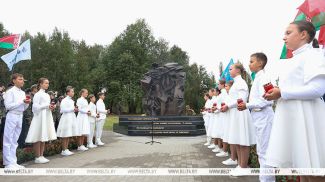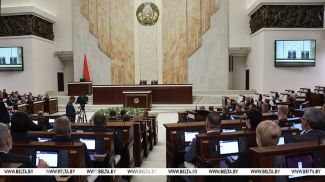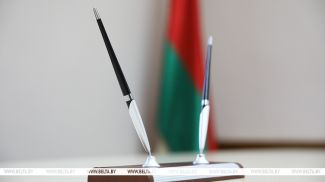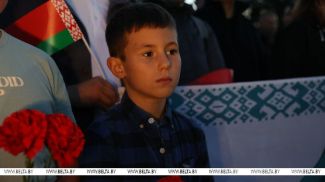MINSK, 1 March (BelTA) – The number of supporters of nuclear energy development in Belarus has reached 49.8%, Yelena Martishchenkova, a researcher at the Department of Sociology at the Institute of Sociology of the National Academy of Sciences of Belarus (NASB), said during an online press conference hosted by BelTA.
A regular survey was held in May 2016 as part of the effort to monitor the public opinion on the current state and development prospects of the country's fuel and energy sector. “The analysis of the results showed that although there were slight variations across regions and social groups, no significant changes in the distribution of respondents' answers to the question about the need for nuclear energy in Belarus have happened. The number of nuclear energy supporters has grown slightly over the past year: from 47.8% to 49.8%, i.e. by 2%. The number of those who hesitate, i.e. those who find it difficult to answer, decreased by 3.4%, from 32.4% to 29%,” she said.
As for the social groups, the biggest support for the NPP project is seen among entrepreneurs, company managers, rural dwellers, blue collars and students. The share of NPP supporters among men is 55.9%, among women – 44.8%; pensioners – 48.4%, youth – 50.9%; rural and urban dwellers – 53.9% and 48.4% respectively.
“The majority of the population (55.7%) believe that with the launch of the nuclear power plant the situation in the energy industry will improve. This is a positive fact, in our view. Some 34.9% are confident that with the plant up and running, Belarusian goods and services will become more competitive,” Yelena Martishchenkova added. However, we need to take into account the fact that some part of the population is still hesitant, as evidenced by the large number of those who found it hard to answer (29%).
Lilia Dulinets, Deputy Director of the Nuclear Energy Department at the Belarusian Energy Ministry, noted that in all countries, including those with a well-performing nuclear industry, there are both supporters and opponents of nuclear power, as evidenced by the opinion polls. For example, the share of supporters of nuclear power is high in the countries that have a long and successful history of trouble-free operation of nuclear plants, such as the Republic of Korea and France (around 60%). Some 40% of people in the United States believe that the advantages of nuclear power outweigh the disadvantages. An opinion survey conducted in Russia revealed that over 75% of the population are in favor of nuclear energy.
“In Belarus, the public opinion regarding the development of nuclear power in the country has been monitored by the Institute of Sociology of the National Academy of Sciences of Belarus (NASB) regularly since 2005. The results of opinion surveys show that the share of supporters of the use of nuclear fuel for electricity generation is around 50%, which is quite high compared with the world's average,” Lilia Dulinets noted.
Yelena Martishchenkova noted that the monitoring of public opinion conducted by the Energy Ministry in Belarus has been the first industry-specific project in the field of public relations. From its inception, the project has been aimed at identifying trends in the public perception of energy-related issues and determining how people evaluate the performance of the industry in terms of the provision of services. The surveys are also designed to study people's opinion about the prospects of improving the qualify of energy services, saving resources, modernizing the sources and basic funds, and increasing the use of local and renewable energy sources, including nuclear fuel, which means the construction of an own nuclear power plant. “Such feedback from the public is very important, not only for keeping track of public opinion, but also for making strategic decisions,” Yelena Martishchenkova emphasized.
Opinion polls are conducted annually as a nationwide representative sample survey. They collect feedback from 2,000 respondents, including 300 residents of Ostrovets District, Grodno Oblast. The respondents are selected against the criteria of age, sex, education, social status, the region of residence and location (urban or rural).













